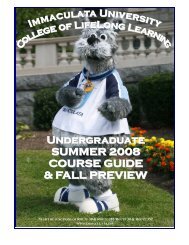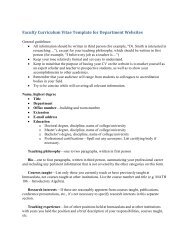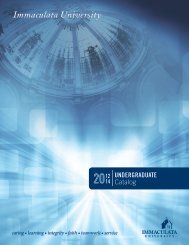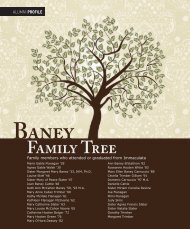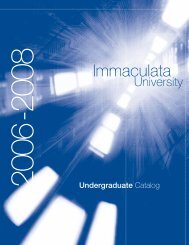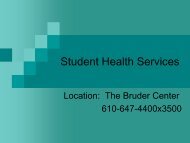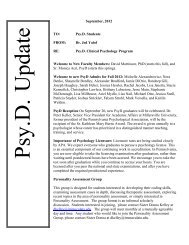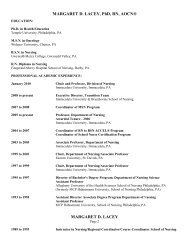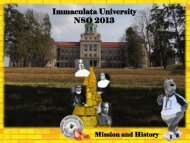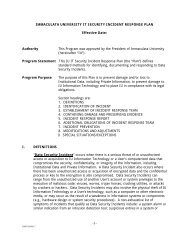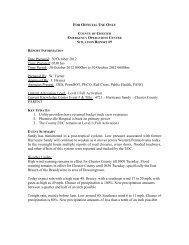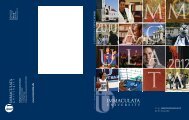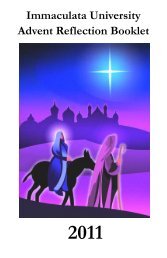Undergraduate Catalog 2008-2010 - Immaculata University
Undergraduate Catalog 2008-2010 - Immaculata University
Undergraduate Catalog 2008-2010 - Immaculata University
You also want an ePaper? Increase the reach of your titles
YUMPU automatically turns print PDFs into web optimized ePapers that Google loves.
Theology<br />
Stephen L. Martin, Chair<br />
Sister John Sheila Galligan<br />
Sister Mary Henrich<br />
Sister Margaret McDonald<br />
Sister Regina Foy<br />
OUTCOMES<br />
• To teach students to explore Christian revelation and heritage<br />
in the light of the Catholic intellectual tradition<br />
• to provide an academic curriculum in the areas of biblical,<br />
systematic, moral, and sacramental theology<br />
• to promote affective appreciation of prayer, ministry and<br />
Gospel proclamation<br />
• to correlate the experience of learning with the reality of<br />
contemporary life<br />
REQUIREMENTS FOR MAJOR<br />
• Theology (BA): (in addition to the 9 credits in the Liberal<br />
Arts Core) a minimum of eight Theology courses including THE<br />
109, 110, 222, 306 and one from each of the following clusters:<br />
1) THE 211, 225, 230, 303; 2) THE 311, 312, 325, 321; 3)<br />
THE 217, 317, 408, 417.<br />
Students concentrating in Theology may obtain certification in<br />
Elementary Education, Early Childhood or Special Education.<br />
These programs will only be available to students (CUS and<br />
CLL) who begin study on or prior to September, 2009 and who<br />
are eligible for PDE certification prior to January 1, 2013.<br />
REQUIREMENTS FOR MINOR<br />
• Theology: THE 109, 110, 218, 222, 306 and one elective<br />
course chosen from theology course offerings.<br />
REQUIREMENT FOR ASSOCIATE OF ARTS<br />
• Theology (AA): (in addition to the six Theology credits in the<br />
Liberal Arts Core) THE 109, 110, 218, 222, 306 and three (3)<br />
elective credits from one of the following clusters: 1) THE<br />
206, 211, 303; 2) THE 311, 312, 325; 3) THE 217, 408, 417.<br />
CERTIFICATE PROGRAM<br />
• Certificate in Theology: Certificates are awarded to those<br />
students who complete 18 semester hours with a grade of B or<br />
above in the following courses: nine credits from the following:<br />
THE 109, 110, 218, 222, 306; nine credits from the following:<br />
THE 206, 209, 211, 212, 217, 220, 311, 321, 408, 417.<br />
• Certificate in John Paul II Studies: Certificates are awarded<br />
to those students who complete 18 semester hours with a<br />
grade of B or above in the following courses: nine credits<br />
from the following: THE 222, 225, 331; nine credits from the<br />
following selections: THE 200 (Special Topics reflecting John<br />
Paul II themes), 212, 218, 220, 230, 317, 333.<br />
THE 101 Seeking the Truth in Love (3)<br />
Studies the Bible, inquires into the nature of faith, reflects on<br />
what it means to be human, and provides a foundation for making<br />
moral choices. The topics of virtue, freedom, and conscience will<br />
be explored. (Offered in accelerated format only.)<br />
THE 109 Introduction to Theology (3)<br />
The course aims to introduce students to the academic discipline<br />
of theology and to provide an overview of theology’s various<br />
specialties such as biblical, systematic, moral, and sacramental<br />
theology. It seeks to deepen students’ understanding of the<br />
Christian faith and its significance for their lives in the<br />
contemporary world.<br />
THE 110 Introduction to Sacred Scripture (3)<br />
A general overview of Sacred Scripture. Students will gain an<br />
acquaintance with the history and geography of the biblical<br />
literature; the formation of the two testaments and types of biblical<br />
literature; important themes and persons of the Bible, and the role of<br />
scripture in the Church and in Christian theology today.<br />
THE 112 Francis of Assisi: Path to Joy (3)<br />
This course will explore the life and legacy of Francis of Assisi.<br />
Course topics will include Francis’ core spiritual insights, prayers<br />
and his witness to simplicity, joy and peace-making.<br />
THE 200 Topics in Theology (1-3)<br />
Selected topics to enrich the understanding of a variety of<br />
theological themes.<br />
THE 201 Living the Truth in Love (3)<br />
Investigates, reflects, and applies moral principles to personal<br />
and professional life. Issues concerning life and death, sexuality<br />
and marriage, rights and justice are among the many topics<br />
addressed. (Offered in the accelerated format only.)<br />
THE 206 Exploring God and Self in Prayer (3)<br />
This course aims to deepen students’ understanding and<br />
experience of what prayer is and to foster familiarity with some<br />
approaches to prayer used by the great spiritual masters in the<br />
Christian tradition. It seeks to encourage growth and development<br />
of the Christian life through an exploration of the many prayer<br />
styles which are part of the rich Catholic spiritual tradition.<br />
THE 209 The Mystery of Sin and Salvation (3)<br />
This course explores the nature and dimensions of the<br />
theological concepts of sin and salvation. Special focus on the<br />
model of the seven capital sins and the corresponding virtues and<br />
gifts of the Spirit.<br />
THE 211 Christology (3)<br />
The course examines the person and ministry of Jesus of<br />
Nazareth and explores the theological significance of the mystery of<br />
Jesus Christ for our world today. It poses the question which Jesus<br />
himself posed to his disciples: “But who do you say that I am?”<br />
(Mk. 8:29) and examines various responses to this question<br />
throughout the Christian tradition. It also offers a historical<br />
overview of various waves of renewal in Christology and highlights<br />
some contemporary emphases in the study of Christology today.<br />
THE 212 Insights and Images: Mary Rediscovered (3)<br />
This course delves into the Gospel portrait of Mary, the<br />
development of Marian doctrine and forms of authentic Marian<br />
devotion. John Paul II’s Marian teaching will also be explored.<br />
THE 217 Christian Marriage and Family (3)<br />
This course offers a study of the history and theology of<br />
marriage and family life by tracing the Judeo-Christian<br />
understanding of marriage from the Old Testament through the New<br />
Testament to the present. Special attention is given to recent<br />
Catholic Church documents regarding marriage and family life.<br />
THE 218 Introduction to Christian Ethics (3)<br />
This course seeks to introduce students to the study of Christian<br />
ethics. It explores the foundational aspects of Christian ethics and<br />
107



